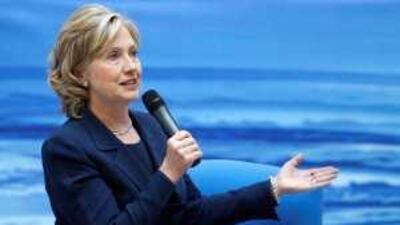In reference to Emile Hokayem's opinion article On Iran, no easy answers for Mrs Clinton or the Gulf (February 17), isn't the script familiar? Do not the US secretary of state Hillary Clinton's statements echo her predecessor's remarks before the invasion of Iraq in 2003? The same game plan seems to be in the offing. Iran is building nuclear weapons, Iran is a rogue state, Iran is supporting terrorism, Iran is a threat to its neighbours. The latest in the list of accusations is that Iran is heading towards a military dictatorship.
There is so much similarity in the US preparations to build a case to wage war against Iraq and Iran. When and how this game plan is executed and what will be the consequences and fallout from this, only time will tell. And time, it appears, is not favouring the US president Barack Obama. He has yet to fulfil the assurances he made to the Arabs on the Palestinian-Israeli issue. Israel is as determined as it has been all these years to go ahead with its settlements. Despite the US pressure it is moving fast with building more and more new settlements on annexed land.
The US administration does not to want to lose what little goodwill it has earned from the early assurances given by Obama. So the bugaboo is that Iran becoming a nuclear threat to the region. It is more of "crying wolf" to divert the attention of the Arab states. Israel also wants time to complete its plan of developing as many as possible settlements on annexed territory. Iran by its stubbornness and intransigent stand on its nuclear ambitions is providing that space and time. Syed Qamer Hasan, Abu Dhabi
In reference to the article Photography lesson: shoot at sunset, go to jail (February 16), my heart goes out to MA who was jailed for photographing the Abu Dhabi Mina area. As a photographer myself I am dismayed. In most other countries the general rule is: if a photograph can be taken from a point on public land or from private property that could be legally accessed by the average person, then it is fair game for any photographer. While there are grey areas which are exploited by paparazzi, this rule generally works well. If governments or the military have areas of high security, they really should hide them better. A quick search of Google Maps will give anyone with access to the internet satellite shots of all these "secure" locations. Mark Thompson, Abu Dhabi
There is often more information available to the police in security matters than there is to the public. All nations have their security protocols and photography of sensitive areas is commonly dealt with in the same manner. It might not get as much press attention in the West, but individuals regularly have their cameras confiscated for the very same reasons. The police will be investigating the matter, and will probably give the camera back once they are certain of the individual's intent. I am happy the police are active in the protection of state sensitive areas. It means those with bad intentions are less likely to be able to attain the information they need. Kudos to Abu Dhabi police. MA broke the law, end of story. Their priority is, and should always be, security and protection of the state and its people. Security should not be built upon whether an individual's feelings are hurt or not, but on the greater well-being of the state and its inhabitants. BuAhmed al Hashimi, Abu Dhabi
I am an avid reader of Mishaal al Gergawi's work and always respect his balanced views on social issues. However, I must profess surprise at some of the concepts raised in his letter to the editor Frame terms for citizenship carefully (February 16). First, the comparison of the UAE to western countries like the US, Canada and Australia is noted, however I think we need to consider the position of the UAE as a first-world country. First World countries have highly developed economies and human development indices by definition. The UAE has achieved self confidence as an example of adaptation and malleability in order to stand on the world stage in IT (Gitex), sport (golf, horse racing, tennis) and top quality manufacturing (Dubal). Why then is the matter of naturalisation so gingerly approached every time?
Historically speaking, my understanding was that originally when Pakistani (Balochi), Indian and Iranian nationals moved here, there was no boom time whatsoever. In those days the official currency of exchange was the rupee. I concur that people leave their place of birth for a plethora of reasons and these may be examined in subsequent articles. Second, Mr Al Gergawi has raised the issue of embracing cultural practices including language, yet how can one expect any form of integration when, by law, one is not allowed to wear the national dress?
Unofficially, I am sure that many locals would cautiously welcome an integration of other nationalities to be part of the UAE's growth, moving forward together for the simple reason that we need to have a diverse population contributing different ideas and skill sets. Faysal Khan, Abu Dhabi

